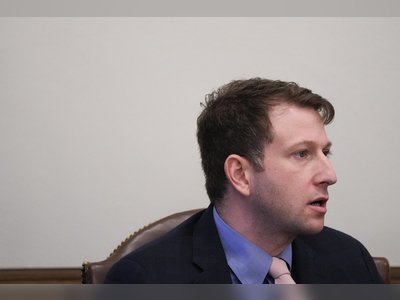White HouseSenateThe HouseSupreme CourtFederal ReserveDOJState DepartmentTreasuryCensusBudget OfficeTrade Representative
WashingTone
Informed by Washington, Defined by Insight
Monday, Mar 02, 2026
WashingTone

U.S. Treasury’s New Guidance on Clean Fuels Production Credit: A Step Towards Greener Transportation
The U.S. Treasury's new policy brief on the Clean Fuels Production Credit aims to bolster the adoption of sustainable fuels, decarbonize transportation, and enhance U.S. competitiveness in clean energy.
On January 10, 2025, the U.S. Department of the Treasury, in collaboration with the Internal Revenue Service (IRS), released long-awaited guidance on the Clean Fuels Production Credit (section 45Z).
This guidance is designed to support the development and adoption of sustainable transportation fuels, focusing on fuels with lifecycle greenhouse gas (GHG) emissions below certain thresholds.
Specifically, the credit targets sustainable aviation fuel (SAF) and non-SAF transportation fuels, providing tax incentives to producers who meet stringent environmental standards.
The policy aims to reduce emissions in key sectors such as aviation and heavy transport while lowering transportation costs for consumers and positioning the U.S. as a leader in the global transition to cleaner fuels.
The Role of the Clean Fuels Production Credit
The Clean Fuels Production Credit is part of a broader effort by the U.S. government to combat climate change by promoting the use of alternative fuels in the transportation sector.
The credit, effective in 2025, will provide a per-gallon tax incentive to producers based on the carbon intensity of their fuels.
By rewarding the production of clean fuels that significantly reduce emissions, the credit is expected to drive innovation in both the aviation and heavy transport industries, which are among the hardest to decarbonize.
In addition to supporting the growth of sustainable aviation fuel (SAF), which has been heralded as a game-changer in the aviation industry's efforts to reduce carbon emissions, the credit extends to non-SAF transportation fuels, such as renewable natural gas (RNG) and other biofuels.
This broad eligibility ensures that multiple sectors and industries can benefit from the policy, further accelerating the transition to a low-carbon economy.
The Emerging Role of Technology in Decarbonizing Transportation
A key feature of the Treasury's guidance is its emphasis on leveraging emerging technologies to determine and verify the carbon intensity of fuels.
As part of the guidance, the IRS and Treasury are releasing the 45ZCF-GREET model, which will help producers calculate the lifecycle GHG emissions of their fuels.
The model will be instrumental in ensuring that only fuels that meet stringent sustainability criteria receive the tax incentive.
This technology-driven approach represents a significant step forward in the regulation of clean fuels, offering clarity and precision in how emissions are measured and accounted for.
The guidance also outlines how producers can use emissions rate tables and the Provisional Emissions Rate (PER) process for fuel pathways and feedstock combinations that are not covered by the standard model.
This flexibility allows the policy to evolve with advancements in fuel production technology, ensuring that it remains relevant as new fuel sources and production methods emerge.
Addressing Barriers and Enhancing Access to Clean Fuels
Despite the promise of clean fuels, challenges remain in ensuring equitable access to these technologies, especially for smaller producers and underserved regions.
The Treasury’s guidance acknowledges these concerns, noting that barriers to clean fuel adoption include the high upfront costs of developing sustainable fuel technologies, limited access to financing, and the complexity of meeting regulatory requirements.
To address these barriers, the policy encourages further engagement between Treasury, the IRS, and stakeholders in the energy and agriculture sectors.
Policymakers are urged to collaborate with industry leaders to develop targeted programs that support innovation and ensure that clean fuel technologies are accessible to all producers, not just large industry players.
Additionally, the guidance addresses the role of climate-smart agriculture (CSA) practices in supporting clean fuel production.
Treasury is considering proposals for recognizing the GHG reduction benefits of CSA practices, such as the use of bio-based feedstocks like corn, soybeans, and sorghum for biofuels production.
These practices not only reduce emissions associated with fuel production but also contribute to broader environmental goals, such as improved water quality and soil health.
Implications for U.S. Competitiveness and Global Leadership
The Treasury’s policy brief highlights the critical role that clean fuels play in positioning the U.S. as a leader in the global transition to a low-carbon economy.
By incentivizing the production of sustainable fuels, the policy aims to enhance the U.S.'s competitiveness in the emerging global market for clean energy.
Countries around the world are increasingly investing in alternative fuel technologies as part of their climate commitments, and the U.S. is positioning itself to be at the forefront of this industry.
Moreover, the Clean Fuels Production Credit is an integral component of the broader U.S. strategy to reduce emissions from the transportation sector, which is one of the largest sources of greenhouse gases in the country.
The success of this policy could set a global standard for sustainable fuel production, particularly as other nations seek to replicate the U.S.'s efforts in decarbonizing aviation and heavy transport industries.
Climate-Smart Agriculture and the Role of Farmers
The inclusion of climate-smart agriculture practices in the Treasury's guidance underscores the importance of farming communities in the transition to a clean energy economy.
By encouraging sustainable farming practices, such as no-till farming, cover cropping, and rotational grazing, the policy creates additional revenue opportunities for farmers while contributing to the broader goal of reducing GHG emissions in the agriculture sector.
Farmers have long played a crucial role in providing feedstocks for biofuels production, and the Treasury's guidance offers them new incentives to adopt climate-smart practices.
This shift not only benefits the environment but also provides a pathway for farmers to increase their income through participation in carbon markets and other environmental programs.
The U.S. Department of Agriculture (USDA) has already made significant investments in climate-smart commodities, supporting the adoption of sustainable farming practices on millions of acres across the country.
The integration of CSA practices into clean fuel production further strengthens the connection between agriculture and clean energy, offering a holistic approach to emissions reduction.
Conclusion: Charting a Path Toward a Sustainable Future
The U.S. Department of the Treasury's release of guidance on the Clean Fuels Production Credit represents a critical step in the nation's efforts to decarbonize the transportation sector.
By incentivizing the production of sustainable fuels, enhancing the role of emerging technologies, and fostering collaboration with the agricultural sector, the policy lays the foundation for a greener, more sustainable future.
As the U.S. continues to navigate the challenges of climate change, this guidance serves as a key piece of the puzzle, helping to reduce emissions, lower transportation costs for consumers, and drive innovation in clean energy.
With the final rules and regulations expected in the coming months, the Treasury's work in this area will undoubtedly play a pivotal role in shaping the future of clean fuel production in the U.S. and around the world.
This guidance is designed to support the development and adoption of sustainable transportation fuels, focusing on fuels with lifecycle greenhouse gas (GHG) emissions below certain thresholds.
Specifically, the credit targets sustainable aviation fuel (SAF) and non-SAF transportation fuels, providing tax incentives to producers who meet stringent environmental standards.
The policy aims to reduce emissions in key sectors such as aviation and heavy transport while lowering transportation costs for consumers and positioning the U.S. as a leader in the global transition to cleaner fuels.
The Role of the Clean Fuels Production Credit
The Clean Fuels Production Credit is part of a broader effort by the U.S. government to combat climate change by promoting the use of alternative fuels in the transportation sector.
The credit, effective in 2025, will provide a per-gallon tax incentive to producers based on the carbon intensity of their fuels.
By rewarding the production of clean fuels that significantly reduce emissions, the credit is expected to drive innovation in both the aviation and heavy transport industries, which are among the hardest to decarbonize.
In addition to supporting the growth of sustainable aviation fuel (SAF), which has been heralded as a game-changer in the aviation industry's efforts to reduce carbon emissions, the credit extends to non-SAF transportation fuels, such as renewable natural gas (RNG) and other biofuels.
This broad eligibility ensures that multiple sectors and industries can benefit from the policy, further accelerating the transition to a low-carbon economy.
The Emerging Role of Technology in Decarbonizing Transportation
A key feature of the Treasury's guidance is its emphasis on leveraging emerging technologies to determine and verify the carbon intensity of fuels.
As part of the guidance, the IRS and Treasury are releasing the 45ZCF-GREET model, which will help producers calculate the lifecycle GHG emissions of their fuels.
The model will be instrumental in ensuring that only fuels that meet stringent sustainability criteria receive the tax incentive.
This technology-driven approach represents a significant step forward in the regulation of clean fuels, offering clarity and precision in how emissions are measured and accounted for.
The guidance also outlines how producers can use emissions rate tables and the Provisional Emissions Rate (PER) process for fuel pathways and feedstock combinations that are not covered by the standard model.
This flexibility allows the policy to evolve with advancements in fuel production technology, ensuring that it remains relevant as new fuel sources and production methods emerge.
Addressing Barriers and Enhancing Access to Clean Fuels
Despite the promise of clean fuels, challenges remain in ensuring equitable access to these technologies, especially for smaller producers and underserved regions.
The Treasury’s guidance acknowledges these concerns, noting that barriers to clean fuel adoption include the high upfront costs of developing sustainable fuel technologies, limited access to financing, and the complexity of meeting regulatory requirements.
To address these barriers, the policy encourages further engagement between Treasury, the IRS, and stakeholders in the energy and agriculture sectors.
Policymakers are urged to collaborate with industry leaders to develop targeted programs that support innovation and ensure that clean fuel technologies are accessible to all producers, not just large industry players.
Additionally, the guidance addresses the role of climate-smart agriculture (CSA) practices in supporting clean fuel production.
Treasury is considering proposals for recognizing the GHG reduction benefits of CSA practices, such as the use of bio-based feedstocks like corn, soybeans, and sorghum for biofuels production.
These practices not only reduce emissions associated with fuel production but also contribute to broader environmental goals, such as improved water quality and soil health.
Implications for U.S. Competitiveness and Global Leadership
The Treasury’s policy brief highlights the critical role that clean fuels play in positioning the U.S. as a leader in the global transition to a low-carbon economy.
By incentivizing the production of sustainable fuels, the policy aims to enhance the U.S.'s competitiveness in the emerging global market for clean energy.
Countries around the world are increasingly investing in alternative fuel technologies as part of their climate commitments, and the U.S. is positioning itself to be at the forefront of this industry.
Moreover, the Clean Fuels Production Credit is an integral component of the broader U.S. strategy to reduce emissions from the transportation sector, which is one of the largest sources of greenhouse gases in the country.
The success of this policy could set a global standard for sustainable fuel production, particularly as other nations seek to replicate the U.S.'s efforts in decarbonizing aviation and heavy transport industries.
Climate-Smart Agriculture and the Role of Farmers
The inclusion of climate-smart agriculture practices in the Treasury's guidance underscores the importance of farming communities in the transition to a clean energy economy.
By encouraging sustainable farming practices, such as no-till farming, cover cropping, and rotational grazing, the policy creates additional revenue opportunities for farmers while contributing to the broader goal of reducing GHG emissions in the agriculture sector.
Farmers have long played a crucial role in providing feedstocks for biofuels production, and the Treasury's guidance offers them new incentives to adopt climate-smart practices.
This shift not only benefits the environment but also provides a pathway for farmers to increase their income through participation in carbon markets and other environmental programs.
The U.S. Department of Agriculture (USDA) has already made significant investments in climate-smart commodities, supporting the adoption of sustainable farming practices on millions of acres across the country.
The integration of CSA practices into clean fuel production further strengthens the connection between agriculture and clean energy, offering a holistic approach to emissions reduction.
Conclusion: Charting a Path Toward a Sustainable Future
The U.S. Department of the Treasury's release of guidance on the Clean Fuels Production Credit represents a critical step in the nation's efforts to decarbonize the transportation sector.
By incentivizing the production of sustainable fuels, enhancing the role of emerging technologies, and fostering collaboration with the agricultural sector, the policy lays the foundation for a greener, more sustainable future.
As the U.S. continues to navigate the challenges of climate change, this guidance serves as a key piece of the puzzle, helping to reduce emissions, lower transportation costs for consumers, and drive innovation in clean energy.
With the final rules and regulations expected in the coming months, the Treasury's work in this area will undoubtedly play a pivotal role in shaping the future of clean fuel production in the U.S. and around the world.











